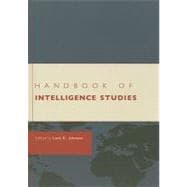
Note: Supplemental materials are not guaranteed with Rental or Used book purchases.
Purchase Benefits
What is included with this book?
| List of figures and tables | p. viii |
| Notes on contributors | p. ix |
| Glossary | p. xiii |
| Introduction | p. 1 |
| The study of intelligence | |
| Sources and methods for the study of intelligence | p. 17 |
| The American approach to intelligence studies | p. 28 |
| The historiography of the FBI | p. 39 |
| Intelligence ethics: laying a foundation for the second oldest profession | p. 52 |
| The evolution of modern intelligence | |
| The accountability of security and intelligence agencies | p. 67 |
| "Knowing the self, knowing the other": the comparative analysis of security intelligence | p. 82 |
| US patronage of German postwar intelligence | p. 91 |
| The intelligence cycle and the search for information: planning, collecting, and processing | |
| The technical collection of intelligence | p. 105 |
| Human source intelligence | p. 118 |
| Open source intelligence | p. 129 |
| Adapting intelligence to changing issues | p. 148 |
| The challenges of economic intelligence | p. 163 |
| The intelligence cycle and the crafting of intelligence reports: analysis and dissemination | |
| Strategic warning: intelligence support in a world of uncertainty and surprise | p. 173 |
| Achieving all-source fusion in the Intelligence Community | p. 189 |
| Adding value to the intelligence product | p. 199 |
| Analysis for strategic intelligence | p. 211 |
| Counterintelligence and covert action | |
| Cold War intelligence defectors | p. 229 |
| Counterintelligence failures in the United States | p. 237 |
| Emigre intelligence reporting: sifting fact from fiction | p. 253 |
| Linus Pauling: a case study in counterintelligence run amok | p. 269 |
| The role of covert action | p. 279 |
| The future of covert action | p. 289 |
| Intelligence accountability | |
| Intelligence oversight in the UK: the case of Iraq | p. 301 |
| Intelligence accountability: challenges for parliaments and intelligence services | p. 315 |
| Intelligence and the rise of judicial intervention | p. 329 |
| A shock theory of congressional accountability for intelligence | p. 343 |
| Appendices | p. 361 |
| The US Intelligence Community (IC), 2006 | p. 363 |
| Leadership of the US Intelligence Community (IC), 1947-2006 | p. 364 |
| The intelligence cycle | p. 366 |
| Select Bibliography | p. 367 |
| Index | p. 371 |
| Table of Contents provided by Ingram. All Rights Reserved. |
The New copy of this book will include any supplemental materials advertised. Please check the title of the book to determine if it should include any access cards, study guides, lab manuals, CDs, etc.
The Used, Rental and eBook copies of this book are not guaranteed to include any supplemental materials. Typically, only the book itself is included. This is true even if the title states it includes any access cards, study guides, lab manuals, CDs, etc.